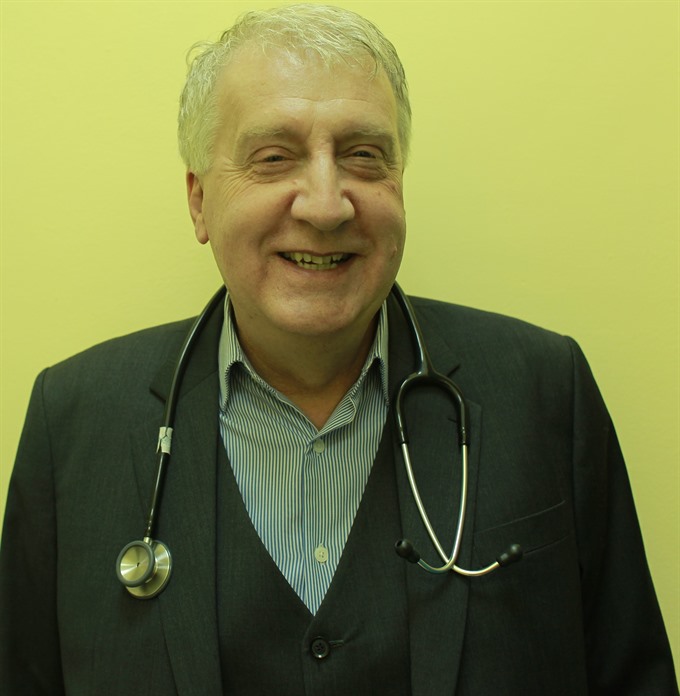 Life & Style
Life & Style

Nicotine is the chemical in tobacco that makes you want to smoking, and can be as addictive as cocaine. It increases the release of brain chemicals called neurotransmitters, which help regulate mood and behaviour. One of these neurotransmitters is dopamine, which makes you feel good. Getting that dopamine boost is part of the addiction process.
 |
| Doctor William Brian McNaul. — Photo courtesy of Family Medical Practice |
By Dr William Brian McNaull*
May 31, 2017 is the World No Tobacco Day
Hooked! One substance to rule them all
Nicotine dependence (smoking) is an addiction to tobacco products caused by the drug nicotine. Cigarette, cigar and pipe smoke contains thousands of chemicals, including nicotine. Nicotine results in physical and mood-altering effects to your brain, which is temporarily pleasing, and subsequently leads to dependence.
Nicotine is the chemical in tobacco that makes you want to smoking, and can be as addictive as cocaine. It increases the release of brain chemicals called neurotransmitters, which help regulate mood and behaviour. One of these neurotransmitters is dopamine, which makes you feel good. Getting that dopamine boost is part of the addiction process.
To overcome your dependence on tobacco, you need to deal with the behaviour and routine you associate with smoking.
Your Health: The other 4,799 substances!
While it’s the nicotine in tobacco that keeps you hooked, the toxic effects come mainly from other substances in tobacco.
Tobacco smoke contains more than 60 known cancer-causing chemicals and more than 4,800 other harmful substances. The health problems are real and numerous:
- Lung cancer risk increases dramatically, as well as emphysema and chronic bronchitis.
- Heart and circulatory system problems: Smoking increases your risk of dying of cardiovascular disease, including heart attack and stroke. Smoking 15 cigarettes per day doubles your heart attack risk.
- Smoking is a major cause of cancers of the esophagus, larynx, throat and mouth and is also connected to cancers of the bladder, pancreas, kidney, cervix and stomach.
- Skin structure changes, causing premature aging and wrinkles.
- Increased infertility and impotence: Smoking increases the risk of infertility in women and impotence in men.
- Pregnancy and newborn complications: Mothers who smoke while pregnant face a higher risk of miscarriage, preterm delivery, decreased birth weight and sudden infant death syndrome (SIDS) in their newborn.
Second hand smoke: Spouses and partners of smokers have a higher risk of lung cancer and heart disease compared with people who don’t live with a smoker. If you smoke, your children will be more prone to asthma and ear infections.
Halt the Habit: Always Hope!
Withdrawal cravings, irritability and anxiety? There’s good news -- medication and counseling both work. Medication help you cope with withdrawal symptoms, especially in the first few weeks when the craving is the strongest, while behavioural treatment help you develop the skills you need to stay away from tobacco for the long run. The more time you spend with a counselor (also available at Family Medical Practice Hanoi), the better your treatment results will be.
Irrespective of age, your health will benefit if you stop smoking. Just 20 minutes after your last cigarette, your heart rate goes down. Twelve hours later, levels of carbon monoxide, a toxic gas, in your blood return to normal. Your lung function improves and your circulation starts to get better within three months. After a year, your risk of having a heart attack drops by half. And after five to 15 years, your stroke risk will be the same as that of a nonsmoker.
Medications
Nicotine replacement therapy (NRT) is the main stay of medical treatment for nicotine dependency. NRT gives you nicotine without the other harmful chemicals in tobacco smoke. But if you’re pregnant or breast-feeding or you’re below 18, talk to your doctor before taking any over-the-counter nicotine replacement products.
Many people mistakenly believe that nicotine causes cancer, but that’s not the case. Nicotine replacement medication, including patches, gums, lozenges, nasal sprays and inhalers, can help relieve difficult withdrawal symptoms and cravings. The best time to start using nicotine replacement is on the day you decide to quit. It is best to talk to us at Family Medical Practice before commencing any of these nicotine products as their usage and potential side effects need to be explained.
Antidepressants: Antidepressant drug bupropion (Zyban, Wellbutrin) increases levels of dopamine and norepinephrine, brain chemicals that are also boosted by nicotine.
Counseling and support groups: Medication help you cope with withdrawal symptoms, while behavioural treatment helps you develop the skills you need to stay away from tobacco over the long run. The more time you spend with a counselor the better your treatment results will be.— Family Medical Practice Vietnam
* Doctor William Brian McNaull serves as Medical Director at Family Medical Practice Hanoi. He brings extensive experience to the practice.
For more advice on any medical topics, visit Family Medical Practice Hanoi on 298 I Kim Mã, Ba Đình, Tel: (04 or 024 from June 17th) 3843 0748. Email: hanoi@vietnammedicalpractice.com.
FMP’s downtown HCM City location is at Diamond Plaza, 34 Lê Duẩn, District 1; Other facility is at 95 Thảo Điền Street, District 2. Tel: (08) 38227848. Email: hcmc@vietnammedicalpractice.com
FMP Danang is located on 96-98 Nguyễn Văn Linh Street, Hải Châu District, Đà Nẵng. Tel: (0236) 3582 699. Email: danang@vietnammedicalpractice.com.




